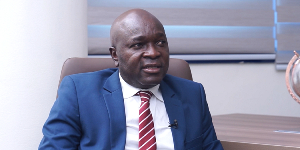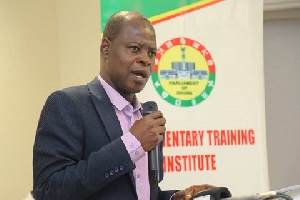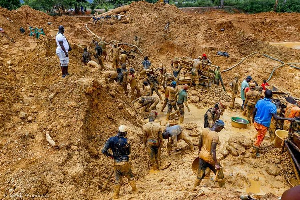Ghana Integrity Initiative (GII), the local chapter of Transparency International has launched the Mining for Sustainable Development (M4SD) programme.
The Programme, which is being coordinated by Transparency International Secretariat through Transparency International Australia, is being implemented in Ghana by GII.
It seeks to address where and how corruption could get a foothold in the mining approval process – that is combating corruption before ground is even broken.
Under Phase one of the project, which was launched 2016, national chapters from 20 resource-rich countries conducted risk assessments to understand the nature and source of corruption risks in mining approval processes.
The Mining Awards Corruption Risk Assessment (MACRA) Tool was developed specifically to conduct these assessments.
While under Phase two, in which Ghana is participating, national chapters of 20 countries would develop and implement action plans to prevent corruption risks identified in Phase I.
They would work with key stakeholders – government, civil society, local communities, and the mining industry -as part of a global strategy to build trust, improve transparency, and influence behaviour change in the mining sector.
The programme would advocate for the improvement of national and international policy and practice, and the strengthening of existing mining transparency initiatives and standards.
Mrs Linda Ofori-Kwafo, Executive Director, GII, in a speech read on her behalf at the M4SD Programme launch and Inception Meeting in Accra, said it was acknowledged that globally the extractive sector could be a source of livelihood for local people, supports regional development, and helps to boost national economies.
She noted that however, these benefits had eluded many resource rich countries due to both institutional and behavioural weaknesses.
“Weaknesses which left unchecked, poor people living in these resource rich communities turn to be the victims of the unintended health and development consequences,” she said.
“All of us here today bears testimony to the harm illegal mining has unleashed on the people living in mining communities in Ghana.”
She said a number of organisations had in recent years initiated interventions to tackle corruption at every stage of the mining value chain; stating that however, given that the risk of corrupt was particularly high at the very start of the value chain, Transparency International had also turned a spotlight on this process that can be so problematic.
She said that the Organisation for Economic Corporation and Development (OECD) affirms this need when it found a quarter of all corruption cases in the oil, gas and mining sectors occurred at the licensing stage (OECD, 2016).
Mrs Ofori-Kwafo said the Transparency International launched the M4SD Programme in 2016 to enhanced transparency and accountability in government processes to award mining sector licenses, permits and contracts.
She said Ghana's resource endowment makes her a country of interest whenever there were global initiatives such as the M4SD and thus GII’s involvement in the M4SD Programme.
Prof Kwame Karikari, Dean of Communication Studies, Wisconsin International University College, Ghana and Board Chair of Graphic Communications Group Limited, who formally launched the M4SD project, said the project would go a long way to address the issue of transparency in the mining sector.
He said the project was also an opportunity to strengthen democratic governance in a major economic area like the mining sector.
Dr Abdulai Darimani, Research Consultant of the Project, said licensing was one of the areas in which risks and vulnerabilities for corruption in the mining value-chain occur.
“Eliminating the risks and vulnerabilities is an important part of effort towards enhancing the contribution of mining to the national economy,” he said.
Mr Jacob Ahuno, Programmes Officer of the M4SD programme, said the goal of the project was to ensure that decisions about approving mining projects benefit the public, were free of corruption and promote sustainable development.
Dr Steven Manteaw, Co-Chair of the Ghana Extractive Industries Transparency Initiative, said with regards to contracts, the corruption in the mining sector was more about the negotiation of the fiscal terms as against the abuse of the processes.
General News of Tuesday, 14 May 2019
Source: ghananewsagency.org
Ghana Integrity Initiative launches Mining for Sustainable Development programme
Sports
![Benjamin Asare, [L] and Razak Simpson Benjamin Asare, [L] and Razak Simpson](https://cdn.ghanaweb.com/imagelib/pics/293/29382588.295.jpg)
Local players must be given more opportunities to compete at Black Stars - Prosper Narteh Ogum
Business




![Mike 2 [L] and Richard Nii-Armah Quaye Mike 2 [L] and Richard Nii-Armah Quaye](https://cdn.ghanaweb.com/imagelib/pics/971/97111172.295.jpg)





